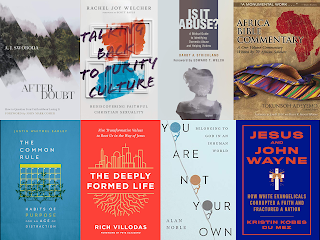2021 Best Books of the Year
As I do every year, I'm offering some of my favorite books I've read in 2021. All of these are great books. Many are ones I've already returned to repeatedly or found myself thinking about months later. If you'd like to visit about any of them, I'm always game.
Best Overall
After Doubt, A.J. Swoboda - There are lots of books trying to answer specific doubts, but few talking about the actual experience and process of doubting. Swoboda's volume is a gem, especially in an age much enamored with deconstructing faith. He is neither afraid of that process nor naive about it, instead giving helpful advice on how to wisely question without getting lost in the weeds.
Talking Back to Purity Culture, Rachel Joy Welcher - I'm hardly the only one to sing this book's praises. There are a lot of books from within evangelical Christianity questioning and challenging norms around sexuality, gender, and marriage. I think these challenges are needed, but too often the books end up being purely destructive, leaving little sense of how we might move forward in obedience to Scripture. Welcher's volume is excellent because she both identifies the many problems that accompanied my Christian generation's upbringing in terms of sexuality while still seeking to make positive, biblical suggestions and charting a better way.
Best Pastoral Resource
Is It Abuse?, Darby Strickland - Over the last two years I've been reading books on this and related topics. While I'm pretty familiar with them, one of my goals has been to find the one volume I could recommend to pastors and other church leaders to introduce the topic. This is that book, at least in terms of marital abuse: thorough, biblical, and practical. Given how often pastors mishandle these situations, I'd make it a "must read" for anyone in a ministry role who might encounter such situations, and given their tragic commonness, that means anyone in a ministry role.
Africa Bible Commentary, ed. Tokunboh Adeyemo - Commentaries are always odd recommendations because, unlike the other books on this list, I didn't read all of it, nor do I necessarily agree with all of it. That said, for years I have been collecting resources by non-Western Christians on theology and biblical issues. Many are sadly hard to find in the West, especially addressing topics other than missions, colonialism, or other specifically international topics. This is a one-volume commentary by 70 African bible scholars, covering all of Scripture with a specific eye to how it meets Africans in their churches and faith journeys. It is good as a commentary, given the limits of its size, and occasionally offers exceptional moments of cultural insight.
Best Christian Living
The Common Rule, Justin Whitmel Earley - Both my Christian Living books are about spiritual formation this year, and I debated which one to put first. That said, I found Earley's book had more of a practical impact on me this last year. Seeking to quantify some simple habits of formation into a list of "rules" reflecting those of St. Benedict, he does a great job of recommending helpful practices in our age of smartphones and constant busyness. While I have not adopted all of his specific recommendations, I continue to develop a list of habits for myself in a similar vein.
The Deeply Formed Life, Rich Villodas - This was a weird book. Villodas uses spiritual formation categories to address five diverse areas of the Christian life, from sexual purity to emotional health to racial justice to missional living. It doesn't cohere. However, I found myself edified by each of the discussions, and for several, felt like they were better entry points for believers who hadn't considered such issues than anything else I had read. As a bonus, Villodas (as a mentoree of Peter Scazzero) gets the heart and speaks to the whole person in a healthy and refreshing way.
Best Christ & Culture
You Are Not Your Own, Alan Noble - I'm always hesitant to put end-of-year reads on this list because they have the shine of freshness. However, Noble's book was very helpful to me because of another book I read earlier in the year, The Rise and Triumph of the Modern Self by Carl Trueman. There was much I appreciated about Trueman's work, but as I sat with it, I ended up feeling like it misses the point. While correctly naming and challenging "expressive individualism," Trueman is an intellectual writing a sweeping intellectual history, and like many such endeavors, I felt like he never actually explained why ordinary people would hold such a view or find it compelling.
Enter Noble, whose work I've always appreciated. He discusses the same hyper-individualistic phenomenon with a much broader lens (Trueman's specific focus on gender limits his diagnosis in significant ways) and with a lot more insight into how contemporary narratives, technologies, and structures of life have created the world we live in. While his final constructive chapters didn't wow me, the first 2/3 of the book helped me name a number of impulses and experiences I see in myself and those around me. Insightful stuff.
Jesus and John Wayne, Kristen Kobes Du Mez - I expected to find this book provocative, but was surprised how convincing I found its central narrative about how distorted, Americanized visions of masculinity have shaped the evangelical church in ways that trump biblical ideals. I realize Du Mez has become something of a lightning rod in the last year surrounding these topics, but as a narrative history of ideas, I found it compelling and eye-opening and continue to ponder the insights it provided.
